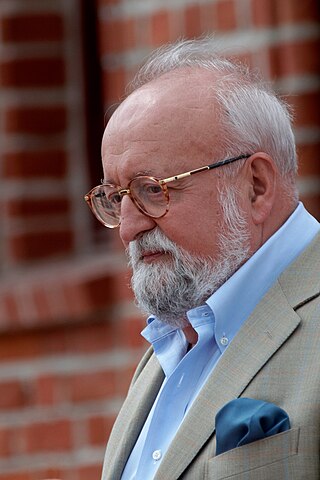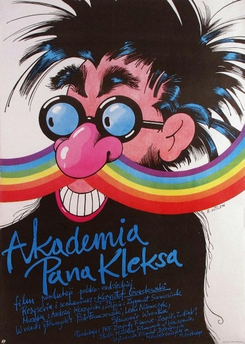
Krzysztof Eugeniusz Penderecki was a Polish composer and conductor. His best-known works include Threnody to the Victims of Hiroshima, Symphony No. 3, his St Luke Passion, Polish Requiem, Anaklasis and Utrenja. His oeuvre includes four operas, eight symphonies and other orchestral pieces, a variety of instrumental concertos, choral settings of mainly religious texts, as well as chamber and instrumental works.

PZL was the largest Polish aerospace manufacturer of the interwar period, and a brand of their aircraft. Based in Warsaw between 1928 and 1939, PZL introduced a variety of well-regarded aircraft, most notably the PZL P.11 fighter, the PZL.23 Karaś light bomber, and the PZL.37 Łoś medium bomber.

Gazeta Wyborcza is a Polish nationwide daily newspaper based in Warsaw, Poland. It was launched on 8 May 1989 on the basis of the Polish Round Table Agreement and as a press organ of the trade union "Solidarity" in the election campaign before the Contract Sejm. Initially created to cover Poland's first partially free parliamentary elections, it rapidly grew into a major publication, reaching a circulation of over 500,000 copies at its peak in the 1990s.

PZL Mielec, formerly WSK-Mielec and WSK "PZL-Mielec" is a Polish aerospace manufacturer based in Mielec. It is the largest aerospace manufacturer in postwar Poland. In 2007, it was acquired by Sikorsky Aircraft Corporation, which retained the brand name. Between 1948 and 2014, the company manufactured approximately 15,600 aircraft.

The Leon Schiller Polish National Film, Television and Theatre School in Łódź, commonly known as Łódź Film School is a Polish academy for future actors, directors, photographers, camera operators and television staff. It was founded on 8 March 1948 in Łódź (Lodz).

Jabol is a slang name for a kind of cheap Polish fruit wine. It is made from fermented fruit and is bottled at 8% to 18% alcohol by volume. Its name is derived from Polish: jabłko, "apple", from which it is often made. Though it is usually fruit flavoured, it can come in other flavours such as chocolate or mint. It comes in a variety of containers and is sold under a variety of names.

Andrzej Smolik is a Polish musician, composer, music producer, and multi-instrumentalist. He began his career as a keyboard player in the band Wilki in 1993. Later he collaborated with Wilki's vocalist, Robert Gawliński on the production of his solo album Solo. In 1996 and 1997 Smolik worked with the group Hey. He also collaborated with Hey's vocalist Kasia Nosowska on her solo album Milena in 1998. In following years he continued to work with Nosowska and Gawliński on their subsequent solo projects. He also worked with DJ Novika and with the group Myslovitz, and Artur Rojek, Mika Urbaniak, Krzysztof Krawczyk. Smolik won the national "Fryderyk" award for composers in 2003 and 2004. And in 2004 he won a 'Polityka's Passport Award' from one of the biggest opinion-forming newsmagazines in Poland - Polityka ("Politics"). His solo albums are Smolik (2001), Smolik 2 (2003), 3 (2006) and "4" (2010).

Dariusz Jabłoński is a Polish film director and producer, president of his own production company, Apple Film Productions, and one of the leading independent producers in Poland.

The Museum of Polish History or the Polish History Museum is a museum and national cultural institute in Warsaw, Poland. The purpose of the museum is to present the most important events in Polish history, with a particular emphasis on Polish traditions of freedom. Since September 2023, the new museum building has been located in the Warsaw Citadel.
Przedsiębiorstwo Realizacji Filmów "Zespoły Filmowe" was a Polish state-owned film studio founded in 1969 after the closure of the production company Zespoły Autorów Filmowych in the aftermath of the March 1968 events.
Henryk Baranowski was a Polish theatre, opera and film director, actor, stage designer, playwright, screenwriter and poet. He is best known for his starring role in the film Dekalog: One directed by Krzysztof Kieślowski, and also appeared as Rosa's brother Josef in Rosa Luxemburg directed by Margarethe von Trotta and as Napoleon in Pan Tadeusz directed by Andrzej Wajda. He directed over 60 theater and opera productions in Europe, Russia and the US and was the Artistic Director of the Teatr Śląski in Katowice in the mid 2000s. He also directed four "television theatre" productions: ...yes I will Yes, For Phaedra (1998), Saint Witch (2003), and Night is the Mother of Day (2004).

Grupa Azoty Zakłady Azotowe "Puławy" PLC is a Polish chemical company based in Puławy, Lublin Voivodeship, specializing in the production of mono-volumes of nitrogen fertilizer, one of the world's largest producers of melamine. It also produces caprolactam, hydrogen peroxide, AdBlue and technical gases.
Platige Image S.A. is a Polish-based company specializing in the creation of computer graphics, 3D animation, and digital special effects for various fields, including advertising, film, art, education, and entertainment. The studio employs a team of over 320 artists, comprising directors, art directors, graphic designers, and producers. The company has won approximately 280 awards and honors. Its animated shorts have garnered top prizes at SIGGRAPH four times and earned two British Academy of Film and Television Arts (BAFTA) awards. Additionally, the studio has been nominated for the Palme d'Or at the Cannes Film Festival and the Golden Lions at the Venice Film Festival, as well as receiving an Oscar nomination.

The Polish Communist Party, or the Communist Party of Poland, is an anti-revisionist Marxist–Leninist communist party in Poland founded in 2002 claiming to be the historical and ideological heir of the Communist Party of Poland, Polish Workers' Party and the Polish United Workers' Party.
Ryszard Lenczewski is a Polish film and television cinematographer with more than thirty feature film credits. Lenczewski has been the cinematographer for four of director Paweł Pawlikowski's feature films. His work on Pawlikowski's Ida (2014) has been widely recognized, garnering nominations for both the Academy Award and the BAFTA Award.

Birds Are Singing in Kigali is a 2017 Polish drama film directed by Joanna Kos-Krauze and Krzysztof Krauze. The film tells the story of a Polish ornithologist who saves a Tutsi girl from certain death. Kos-Krauze completed the film after her husband died mid-production in 2014.

KTS Weszło, informally, due to the city of its headquarters, also called KTS Weszło Warszawa, is a Polish football club based in Warsaw, Masovian Voivodeship. It was founded by media and sports group Weszło and is run as a fan-owned initiative.

Konrad Ksawery Swinarski was a Polish theatrical, television, film and opera director and stage designer.

Akademia pana Kleksa is a 1983 fantasy film directed by Krzysztof Gradowski. An international co-production of Poland and the Soviet Union, the film is based on the 1946 children's novel of the same name by Jan Brzechwa, and is divided into two parts: Przygoda księcia Mateusza and Tajemnica Golarza Filipa.














